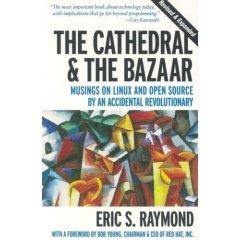| 2020ok Directory of FREE Online Books and FREE eBooks |
Free eBooks > Computers & Internet > Operating Systems > Unix > General > Cathedral and the Bazaar: Musings on Linux and Open Source by an Accidental Revolutionary
Cathedral and the Bazaar: Musings on Linux and Open Source by an Accidental Revolutionaryby Eric S. Raymond  Download Book (Respecting the intellectual property of others is utmost important to us, we make every effort to make sure we only link to legitimate sites, such as those sites owned by authors and publishers. If you have any questions about these links, please contact us.) link 1 About Book Amazon.com It may be foolish to consider Eric Raymond's recent collection of essays, The Cathedral and the Bazaar, the most important computer programming thinking to follow the Internet revolution. But it would be more unfortunate to overlook the implications and long-term benefits of his fastidious description of open-source software development considering the growing dependence businesses and economies have on emerging computer technologies. The Cathedral and the Bazaar takes its title from an essay Raymond read at the 1997 Linux Kongress. The essay documents Raymond's acquisition, re-creation, and numerous revisions of an e-mail utility known as fetchmail. Raymond engagingly narrates the fetchmail development process while elaborating on the ongoing bazaar development method he uses with the help of volunteer programmers. The essay smartly spares the reader from the technical morass that could easily detract from the text's goal of demonstrating the efficacy of the open-source, or bazaar, method in creating robust, usable software. Once Raymond has established the components and players necessary for an optimally running open-source model, he sets out to counter the conventional wisdom of private, closed-source software development. Like superbly written code, the author's arguments systematically anticipate their rebuttals. For programmers who "worry that the transition to open source will abolish or devalue their jobs," Raymond adeptly and factually counters that "most developer's salaries don't depend on software sale value." Raymond's uncanny ability to convince is as unrestrained as his capacity for extrapolating upon the promise of open-source development. In addition to outlining the open-source methodology and its benefits, Raymond also sets out to salvage the hacker moniker from the nefarious connotations typically associated with it in his essay, "A Brief History of Hackerdom" (not surprisingly, he is also the compiler of The New Hacker's Dictionary). Recasting hackerdom in a more positive light may be a heroic undertaking in itself, but considering the Herculean efforts and perfectionist motivations of Raymond and his fellow open-source developers, that light will shine brightly. --Ryan Kuykendall
Related Free eBooks
| Related Tags |












SEND A COMMENT
PLEASE READ: All comments must be approved before appearing in the thread; time and space constraints prevent all comments from appearing. We will only approve comments that are directly related to the article, use appropriate language and are not attacking the comments of others.